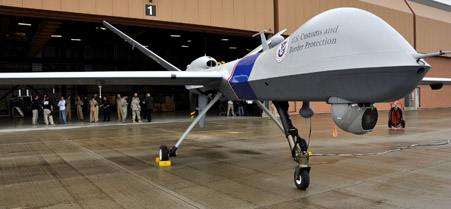Domestic drones put FAA in privacy hot seat
A Brookings Institution panel weighs the implications of having more unmanned aircraft in U.S. airspace.
 Heather Ainsworth/AP
Heather Ainsworth/AP
Under a recently signed law, more remotely piloted aircraft soon could be flying the friendly skies, and it is unclear whether the Federal Aviation Administration is equipped to address the privacy concerns the move brings, panelists said during a think tank discussion Thursday.
The FAA Modernization and Reform Act, which President Obama signed into law Feb. 14, requires the agency to permit expanded domestic use of First-Person View aircraft, also known as unmanned aerial vehicles.
Currently, FAA licenses the use of a limited number of drones within the United States -- more than 300, primarily for law enforcement and research purposes, according to a March 26 analysis of the new law by Harley Geiger of the Center for Democracy and Technology. Under the new act, FAA has until Dec. 31, 2015, to develop and implement final standards for government drones in domestic airspace.
Traditionally associated with stealth military operations, drones would raise a host of additional opportunities and concerns in domestic airspace, participants in the Brookings Institution debate agreed. Before FAA can "open the sky to drones," privacy and oversight concerns should be addressed, Brookings nonresident senior fellow John Villasenor said.
"There's an enormous amount you can do with this stuff if the regulatory latitude is there to do it," event moderator and Brookings senior fellow Benjamin Wittes said.
Heritage Foundation visiting fellow Paul Rosenzweig pointed to the utility of drones in a government space, particularly within the Homeland Security Department, where they could help patrol the more remote stretches of the U.S.-Mexico border. Rosenzweig emphasized that the success of domestic drones in this and other potential fields, including humanitarian causes in the wake of natural disasters, would hinge on developing a proper oversight mechanism.
American Civil Liberties Union staff attorney Catherine Crump expressed concern with domestic drone technology as it relates to law enforcement, saying such devices could grant the government additional power "to control and monitor citizens."
Though intrigued by the implementation of drones for private use as an additional tool for citizens to hold government accountable, Crump said the ACLU remains "concerned that they not become tools of general or pervasive surveillance so that innocent Americans have to worry about whether they're being subject to this kind of monitoring."
With Americans' expectations of privacy constantly resetting, it is difficult to know for sure whether domestic drones would be seen as a flagrant overstepping of citizen boundaries, Brookings nonresident senior fellow Kenneth Anderson said. He noted social networking tools like Facebook and Twitter wouldn't exist today "if people actually cared about their privacy in the way that we traditionally thought about [it]."
Panelists agreed that even though FAA is in charge of developing the standards for the law, the agency should not be involved with privacy issues, because it lacks expertise in this area and such matters do not traditionally fall under its responsibilities.
"I can imagine no worse forum for discussing privacy concerns than the FAA," Rosenzweig said, comparing the notion to asking the Environmental Protection Agency to discuss national security. "It's apples and clouds."
NEXT STORY: San Diego Vet Center Controversy Update





